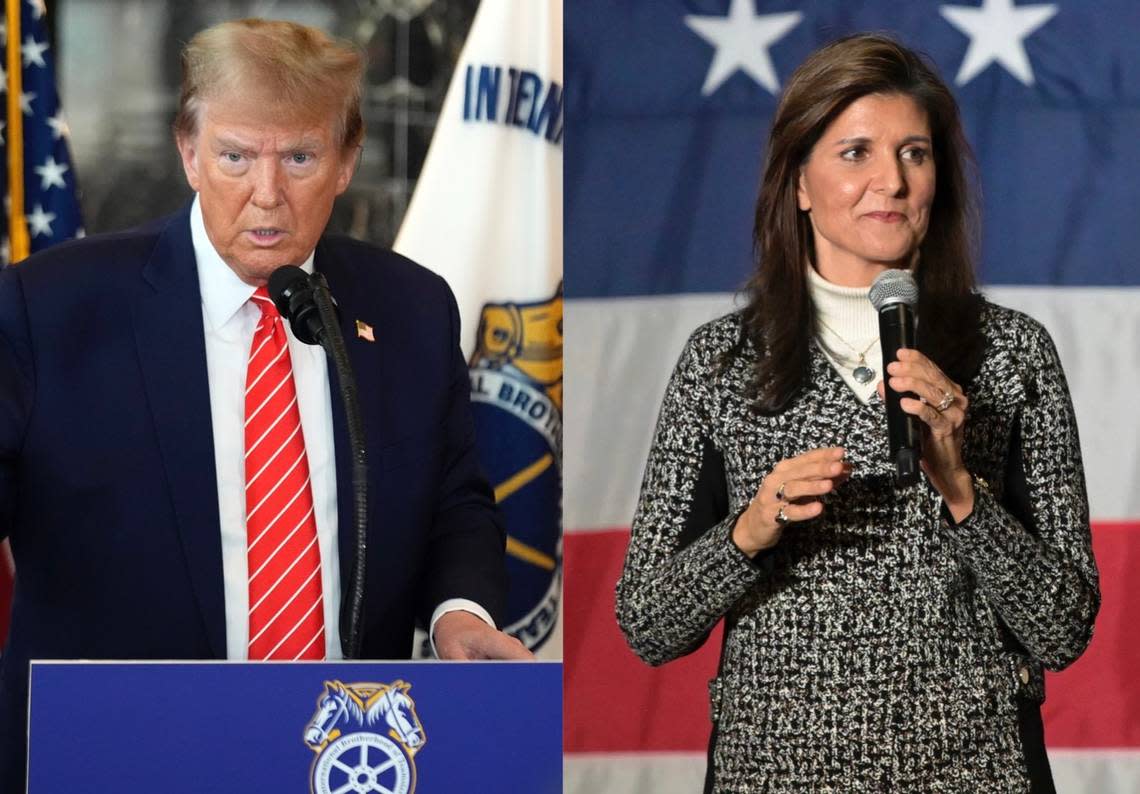Trump and Haley are both expected to win in Nevada. Wait, what? Here’s what to know

- Oops!Something went wrong.Please try again later.
- Oops!Something went wrong.Please try again later.
Due to a strange twist of events, both former President Donald Trump and Nikki Haley will likely emerge victorious in Nevada next week — but only one win will matter.
This is because the Silver State is hosting not one, but two GOP nominating contests in a move that could spell confusion and disenchantment for the state’s voters.
There will be a state-run primary featuring Haley on the ballot, followed by a more important party-run caucus, where Trump will be on the ballot.
More politics news
→ Is abortion a winning issue for Biden? Democrats weigh in
→ Trump ahead in swing states — but there's a catch, poll says
Here’s how it will work
The Nevada-run primary — overseen by the secretary of state — will take place Feb. 6.
In addition to Haley, the ballot will feature Sen. Tim Scott and former Vice President Mike Pence despite the fact that they’ve both bowed out of the race. Lesser known candidates Hirsh Singh, Heath Fulkerson, John Castro and Donald Kjornes will also be listed.
As the sole major active candidate named on the ballot, Haley is well-placed to succeed, according to the Associated Press. However, there will also be an option to select “none of these candidates,” which could potentially undermine her.
Two days later, on Feb. 8, the Nevada Republican party will host a caucus featuring just two candidates on the ballot: Trump and Texas businessman Ryan Binkley.
Trump, who is leading in all state-wide polls, is widely expected to romp to victory in this caucus, according to Axios.
While Trump and Haley will likely both garner the most votes in their respective contests, only votes cast in the party-sponsored caucus will count toward allocating delegates for the Republican National Convention, meaning the state’s primary is functionally meaningless.
“Don’t worry about the primary,” Trump has told Nevada voters. “Just do the caucus thing.”
Why are there two contests?
The two GOP nominating contests can be traced back to a 2021 state law that switched Nevada’s party-run caucus to a government-run primary.
The switch came after complaints were made of the 2020 Democratic caucus in the state. White House hopeful Pete Buttigieg, who lost to Sen. Bernie Sanders in the contest, said there were “irregularities” and “unresolved questions” in the caucus process, according to the Nevada Independent.
Former Nevada Sen. Harry Reid lobbied for the change, arguing it would result in higher voter turnout and a fairer process, according to the Las Vegas Review-Journal.
Caucuses “don’t work,” he told the outlet in 2021. “The system is so unfair.”
Because caucuses require voters to deliberate over candidates, a process which can take hours, turnout tends to be lower than in primaries, according to NPR.
However, after the change was made, state Republicans filed a lawsuit that argued the new law infringed on the party’s right to decide how to nominate candidates.
In May, a court ruled that the state-run primary could not be stopped, but it stipulated that the party was not bound by state law when it came to deciding how it wants to award delegates.
As a result, the Nevada Republican party decided to schedule its own caucus, which alone would choose delegates. To make matters more complicated, it would also bar candidates who participate in the state’s primary from receiving delegates.
“Simply put, candidates who participate in an illegitimate process cannot expect to earn legitimate delegates to the Republican National Convention,” the party said in a statement.
For unexplained reasons, Haley signed up to be on the state-run primary ballot, while Trump opted to be listed on the party-run caucus ballot, according to ABC News.
Criticism
The dueling nominating contests have led to some discontent on the part of Republican voters in the state.
A Las Vegas resident told the Las Vegas Review-Journal that he believed the caucus was “rigged for Trump.”
“There’s no point in participating in the caucus,” another voter told the outlet. “I can’t vote for my candidate. They’re basically disenfranchising me. And this is happening by my own Republican party. I’m very unhappy about it.”
Nevada’s GOP Chairman Michael McDonald has pushed back against criticism, telling NBC News that all candidates’ campaigns were kept informed of the rule change and thereby had the opportunity to file to participate in the caucus.
Will Trump be forced to pay all $83 million in defamation case? Legal experts weigh in
Biden trails Trump in these 7 battleground states — but there’s a catch, poll finds
Is abortion access a winning issue for Biden in 2024? Democratic strategists weigh in

